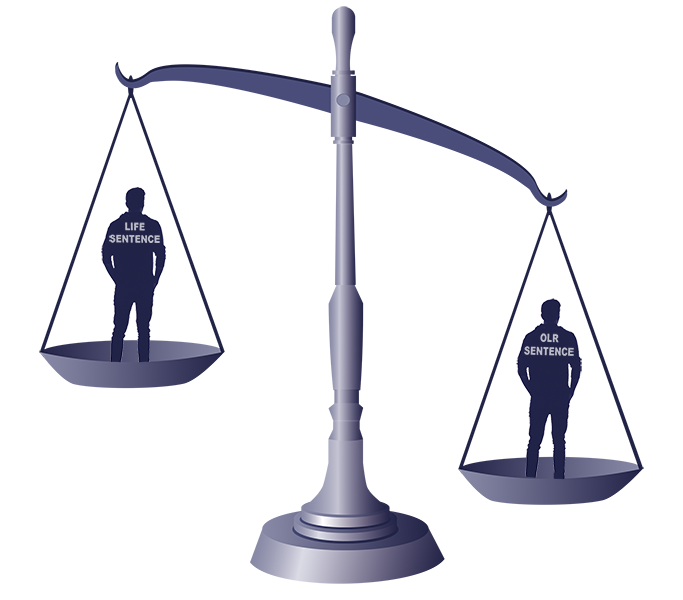Why it is Ineffective
The OLR is a life sentence which can be given for a much larger range of offences, including a pattern of minor offences.
These offences had never previously received a life sentence. We argue that a series of minor offences does not equate to a high risk of serious harm to the public.

a series of minor offences does not equate to a high risk of serious harm
The OLR is a life sentence which can be given for a much larger range of offences, including a pattern of minor offences. These offences had never previously received a life sentence. The OLR has been used to impose a life sentence where the index offence itself may not have caused serious harm. In fact, many OLR prisoners have stated, had they committed a more serious offence attracting a life sentence, they would be released by now or at least have a release date to work towards.
We argue that a series of minor offences does not equate to a high risk of serious harm to the public.

beyond the appropriate punishment
As of 2022, 124 OLR sentences handed out had a punishment part of 4 years or less. 30 have a punishment part of 2 years or less. This appears to undermine the intention of a sentence designed to keep the public safe from only the ‘most serious and violent offenders’. We note the number of OLR’s given to those under 25 years of age. This is especially concerning as it is widely acknowledged that the human brain is still developing at this age.
Indeterminate sentences incarcerate people beyond the appropriate punishment for their crimes, in an attempt to prevent hypothetical future harm to the public. This ignores the real and immediate harm being done to those serving the OLR and to their loved ones.

At the time of the OLR’S implementation, concerns were expressed that the remit for the sentence was too broad and could result in a widening of the net with an increasing number of people incarcerated with no prospect of release, often having committed minor offences.
Those concerns have been realised.
onus should be on
the state
The sentence relies on risk assessments to predict future offending behaviour. However, risk assessments of this nature are controversial and are no better predictors of future offending than a coin toss, yet they are being used to justify indeterminate detention. Risk assessments do not take the unique nature of the OLR into account. They fail to consider the psychological impact of long term indeterminate imprisonment on behaviour and motivation. Realistic assessments based on those serving an OLR therefore become compromised. Post offending risk prediction may be very different for those who have been detained under an OLR but that has yet to be tested as so few are released. If a person is to be deprived of liberty by the state, the bar must be set high and the onus should be on the state to prove the person is too dangerous to be released, even under parole conditions.

containment at all costs rather than rehabilitation
Under the OLR, the burden of proof rests with the prisoners. They are forced to attempt the impossible; providing evidence and demonstrating they are safe for release in a system which does not give them the resources and support to do so.
When the system is built on the premise that the OLR prisoner is inherently dangerous, that impinges on the ability of the system to support the person to change. The focus becomes containment at all costs rather than rehabilitation.
We believe people should be judged by what they have done rather than what they may do in the future.

There are many people with OLR’s who are no longer being offered any risk reduction courses. This was the main reason for the IPP in England being in breach of Human Rights legislation, leading to its abolition.
no hope of progressing towards release
The systems required to manage people with an OLR are not functioning as intended. The OLR requires the Parole Board to rely on the risk assessments being provided to it. There is a requirement for these risk assessments to be reviewed annually and updated when circumstances change. As the OLR population grows, the increased backlog means that this is not happening for many people. Risk Assessment Plans remain static year after year due to lack of resources. Without up to date assessments and implementation of risk assessment plans, people have no hope of progressing towards release.
The courses on offer to reduce risk are experimental and often change when found to be ineffective. Many of the early ones have been abandoned. Some courses offered are not even relevant to risk reduction. As the OLR population grows, access to courses is reduced and there are now waiting lists. Prisoners with a release date are prioritised over OLR prisoners.

We argue that justice is not justice if it is not fair
Parole Board hearings are brief, negative, and very often delayed by inefficiencies in the system. Regularly, the reports and assessments necessary for progress are not completed in time for hearings and when they are presented, can be out of date and inaccurate. The Parole Board has no power to compel the accurate and timeous information it needs, it can only request. There is no oversight and there are no checks and balances over the information that Prison Psychologists and Social Workers provide. Their assessments and opinions are simply accepted. The system is so risk averse in nature that it is almost impossible for a person with an OLR to prove they deserve a chance. We argue that justice is not justice if it is not fair.

A recent ruling in Scotland (May 2024) found that Scottish Ministers were in breach of Article 5 of Human Rights Legislation by failing to provide appropriate rehabilitative avenues for an OLR prisoner. There are many more in the same position and this will only get worse as OLR numbers increase.
The OLR is not sustainable
As the OLR population grows, so do the costs to the Scottish Government and, in turn, to the taxpayer. It is estimated that at current costs, the bill for housing the projected 330 OLR prisoners in 2029 will be £15,510,000. Since so few OLR prisoners are released, there will be a need for a new prison to house them by 2029. Scotland already has one of the highest prison populations in Europe. We argue the OLR is not sustainable.



